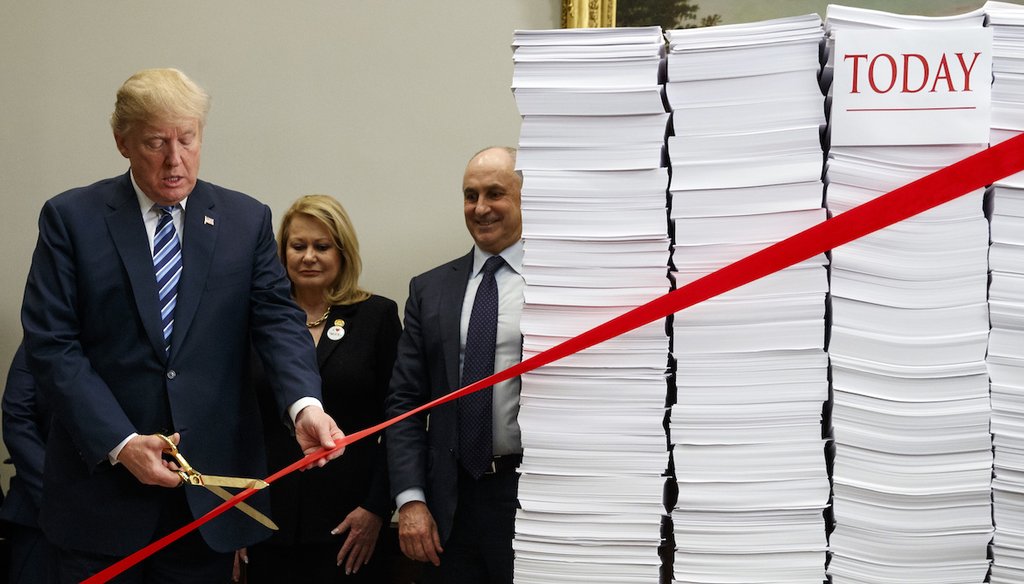

Our only agenda is to publish the truth so you can be an informed participant in democracy.
We need your help.


President Donald Trump cuts a ribbon celebrating record deregulations on Dec. 14, 2017, in Washington.
Trump claimed to have gone above and beyond his campaign promise to eliminate two existing regulations for every new federal regulation at the World Economic Forum at Davos, Switzerland.
"Instead of two for one, we have cut 22 burdensome regulations for every one new rule," Trump said.
The White House directed us to a press release that said federal agencies issued 67 deregulatory actions and imposed three new regulatory actions.
Did Trump really keep his promise, eleven-fold? That’s an exaggeration.
The problem with Trump’s claim is that the Office of Management and Budget laid out different criteria for defining regulatory and deregulatory actions in complying with Trump’s directive.
Significant regulatory actions are defined as leading "to an annual effect on the economy of $100 million or more or adversely affect in a material way the economy (...) ."
"This is an attempt to not have to offset or otherwise subject to this executive order regulatory actions that are routine, or fairly administrative, or technical in nature," said Amit Narang, a regulatory policy advocate at the left-leaning Public Citizen. Examples include time tables for opening up drawbridges, or clearing trees that overhang airplane runways.
But their lifts could count as deregulatory, per the definition of deregulatory actions: a finalized action with total savings greater than zero.
That’s a much lower bar than the $100 million figure.
"When you put things in a ratio form, you’re saying these are comparable units," Cary Coglianese, director of the University of Pennsylvania’s Program on Regulation, said. "These are not."
When Coglianese took a look at the federal regulatory agenda, released Dec. 14, 2017, he found 62 deregulatory actions. (Not all of Trump’s 67 deregulatory actions were included in the review.)
Coglianese found the Office of Management and Budget deemed 8 percent of these economically significant (exceeding $100 million in costs); 27 percent significant enough to warrant review, but not due to economic impacts; and two-thirds non-significant, administrative, or routine.
When we plugged each of the 67 listed actions into the federal regulatory agenda, we found five that were classified as economically significant. The most common classification was non-significant.
Dan Goldbeck, a senior regulatory policy analyst at the right-leaning American Action Forum, used a different methodology. Tracking only rules with some economic estimate of costs or savings, albeit no specified threshold, Goldbeck found the Trump administration had imposed nine deregulatory actions, and five regulatory ones.
By these measures, Trump barely made the two for one ratio.
The deregulatory action with the greatest estimated savings was the repeal of a Federal Acquisition Regulation on "Fair Pay and Safe Workplaces", estimated to have saved $417 million in fiscal year 2017. The repeal was possible thanks to a joint resolution from Congress, which was then ratified by the president.
Trump said, "Instead of two for one, we have cut 22 burdensome regulations for every one new rule."
The Trump administration counted only regulatory actions that were deemed economically significant. Without the same stipulation for deregulatory actions, the ratio compares apples to oranges.
Trump has repealed five economically significant regulatory actions to three economically significant new regulations, according our search of the Office of Management and Budget database. The American Action Forum found he repealed nine regulations for the five he imposed.
Using comparable units, Trump’s claim overestimates his deregulatory accomplishments. By two measures, it’s actually a little less than two for one. We rate this statement Mostly False.
Youtube, President Trump Addresses the World Economic Forum, Jan. 26, 2018
Email interview with Steven Cheung, White House spokesman, Jan. 29, 2018
WhiteHouse.gov, President Donald J. Trump is Delivering on Deregulation, Dec. 14, 2017
The Regulatory Review, Let’s Be Real About Trump’s First Year in Regulation, Jan. 29, 2018
Email interview with Philip Wallach, senior fellow at the R Street Institute, Jan. 26, 2018
Email interview with Angela Kuck, spokeswoman at the American Action Forum, Jan. 26, 2018
American Action Forum, Phase 1 of the one in, two out order: A Final Update, Oct. 3, 2017
WhiteHouse.gov, Memo, April 5, 2017
Reginfo.gov, Regulatory Reform: Two-for-One Status Report and Regulatory Cost Caps, Dec. 7, 2017
Reginfo.gov, Accounting Methods for Calculating Costs under Executive Order 13771, Dec. 7, 2017
Reginfo.gov, Regulatory Reform: Completed Actions Fiscal Year 2017, Dec. 7, 2017
Phone interview with Cary Coglianese, director of the University of Pennsylvania’s Program on Regulation
Phone interview with Amit Narang, a regulatory policy advocate at the left-leaning Public Citizen, Jan. 29, 2018
Email interview with Susan Dudley, director of The George Washington University Regulatory Studies Center, Jan. 29, 2018
In a world of wild talk and fake news, help us stand up for the facts.
